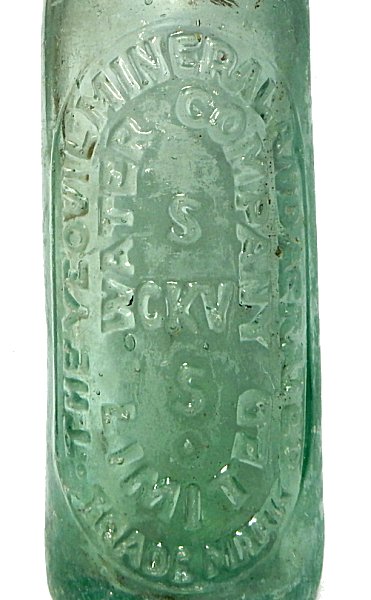The Yeovil Mineral and Aerated water Company
Yeovil Mineral & Aerated Water Co
Union Street
The Yeovil Mineral and Aerated Water Works Company Limited was launched in the summer of 1875 (although 'Works' was soon dropped from the company's title) with a capital of £3,000 (in excess of £2 million at today's value) and shares priced at £10 each, with many announcements in the local press - one of which is reproduced in the Gallery below.
Even though the works were relatively small, the product range was impressive and included seltzer and soda water, lemonade, ginger beer, ginger ale, American ginger ale, hop ale, 'celebrated' orange champagne, sparkling lime juice, tonic beverage and phosphide (!?).
The offices and bottling factory were at 10 Union Street. The building is no longer there but was later described as a ".... desirable freehold property, comprising the substantially-built and well arranged Dwelling-house, situate and being No 10, Union Street, in Yeovil aforesaid, with the large store and room over now used as a factory by the Yeovil Mineral and Aerated Waters Company.... The Premises comprise a convenient Residence, with a good dry cellar. On the ground floor there is a hall with open staircase, two sitting-rooms, kitchen and the usual domestic offices, and on the first floor several good bedrooms. At the rear is a useful court, and adjoining is a large yard, approached from Union Street aforesaid, forming the access to the factory buildings. In the yard is an underground soft water tank, estimated to hold 20 hogsheads." (20 hogsheads is around 1,080 gallons).
The financial backers of the company were William Cox and Thomas W Vincent, listed as Directors, with John Knight as Manufacturing Director.
There were too many men called William Cox in Yeovil in the 1880s to determine which was involved as a backer for the Yeovil Mineral and Aerated Water Company Limited. However more is known about his fellow-backer.
Thomas Willy Vincent was born in Cerne Abbas, Dorset, in 1832 (his parents are unknown - everyone researching him using Ancestry.com confuses at least three different people). In 1851 the 19-year old Thomas was lodging in Covent Garden, London, and working as a Hosier's Box Maker. By 1857 Thomas had married Jane L Collier and had moved to Yeovil. The 1861 census listed him living at Silver Street with Jane and their children; Alfred E (b1856), Caroline J (b1857), Frank C (b1858) and Louis D (b1860). Thomas was working as a Box Maker. By 1871 the family were living at Brunswick Street and they had been joined by their eldest son, James MW (b1854 and absent in the previous census) as well as children born since the previous census; Ida F (b1863), Claude A (b1865), Archibald (b1867), Ralph C (b1869) and Esther S (b1871) and two general domestic servants. Thomas gave his occupation as 'Fancy Box Manufacturer employing 2 men & 7 women'. By 1881, having been a Director of the Yeovil Mineral and Aerated Water Company for some six years, Thomas had given up box making and had moved back to Silver Street where he gave his occupation as a Stationer next door to the Half Moon Inn (possibly buying the premises of the late William Jennings which had been Yeovil's post office until 1875). Living with him and Jane were the four youngest children and a domestic servant. Jane died in the 1880s and Thomas retired to Northam, near Appledore, Devon with his two youngest children. He died in Bideford, Devon in 1918 aged 86.
It is likely that the Manufacturing Director, John Knight, was Thomas Vincent's neighbour and landlord of the Half Moon Inn (see that page for John's biography) between 1871 and 1875 (the founding date of the Yeovil Mineral and Aerated Water Company). If indeed this John Knight was the Manufacturing Director, his stint was fairly short-lived as by 1881 he had moved to Swindon.
In 1872, British soft drink maker Hiram Codd of Camberwell, London, designed and patented a bottle designed specifically for carbonated drinks and used by the Yeovil Mineral and Aerated Water Company (see Gallery below). The Codd-neck bottle was designed and manufactured to enclose a marble and a rubber or leather washer/gasket in the neck. The bottles are filled upside down, and pressure of the gas in the bottle forced the marble against the washer, sealing in the carbonation. The bottle was pinched into a special shape, as can be seen in the photograph below, to provide a chamber into which the marble was pushed to open the bottle. This prevented the marble from blocking the neck as the drink was poured. Soon after its introduction, the bottle became extremely popular with the soft drink industry.
In the 1881 census Robert Allen (b1827), originally from Sherborne, his wife Matilda, their three children and Matilda's mother were living in the accommodation at the factory. Robert gave his occupation as 'Soda Water Manufacturer (Manager) employing 2 men'. The family were still in residence in 1891 and Robert gave his occupation as 'Manager of Aerated Water Company'. Before becoming manager of the works, Robert had been licensee of the Greyhound Inn in South Street. By 1889, he had left his job as Works Manager and had became licensee of the Pall Tavern in Silver Street.
Unfortunately competition in manufacturing aerated waters was quite fierce in Yeovil and during the 1880s the competition included Vincent's Mineral Water Manufactory owned by Earle Vincent and located at the rear of his Royal Osborne Brewery in Sherborne Road and in Middle Street was the premises of J Channing's steam powered aerated water manufactory. Both manufacturers had an impressive range of products, equalling that of the Yeovil Mineral and Aerated Water Company. Channing's was likely bought by Henry Trask in 1891 when he moved to Yeovil from Sherborne.
|
In the 1891 edition of 'Where to Buy' the Yeovil Mineral and Aerated Water Co's business was given the following description -
The
Yeovil
Mineral
and
Aerated
Water
Co.
(Limited), In modern times we have witnessed the birth and development of many manufactures, but few have a greater interest for the thoughtful than the manufacture of aerated waters. This trade has developed at an extraordinary rate recently, and among important firms it has called into existence, that of the Yeovil Mineral and Aerated Water Co. (Limited) is one of the most important in the district. Judging by the history of others, this firm may be considered still in its infancy, yet it has established a reputation, and proved its claim to be one of the best and most important mineral water manufactories in the West of England. The
steam
works in
Union
Street
are
large
and
commodious,
and
their
various
departments
have
been
fitted
and
equipped
throughout
with the
most
modern
and There is a systematic supervision extended over the whole work, and each department is brought under the controlling influence of members of the Company, it is therefore not surprising that the firm have secured a very wide connection. Indeed, not only have they a large circle of supporters among the private families of the district, but in the hotels, restaurants, and refreshment bars all over the country, their beverages are familiar. That this popularity is well deserved may be guessed from what we have said as to the system of manufacture, but it is also corroborated by the strong testimony which eminent medical and scientific men have given as to the beneficial effects of these drinks. It would be a work of supererogation on our part to explain the qualities of the various pleasant drinks which are manufactured by the Yeovil Mineral and Aerated Water Co., as they are well known to most of the natives of Somersetshire and the neighbouring counties, where the familiar mineral water bottles of the firm form a distinct feature at most of the banquets, fetes, and public entertainments throughout the year.
|
The Yeovil Mineral and Aerated Water Company was clearly struggling and probably closed down in the early 1890s. At this time the company's yard, on the corner of Union Street at its junction with South Street, was sold off, initially to the Salvation Army but then to the Yeovil Branch of the Church of England Temperance Society, and the Victoria Temperance Hall was built on the site, opening in 1888. In the 1891 census the dwelling attached to the works was the private residence of an elderly widow.
It was in September 1891 that the sale of the company's remaining premises was first attempted. The business clearly failed to sell and the sale was attempted again in August 1896, and once more in October 1900. This sale also failed and in October 1900 the Yeovil Mineral and Aerated Water Company went into liquidation.
GALLERY
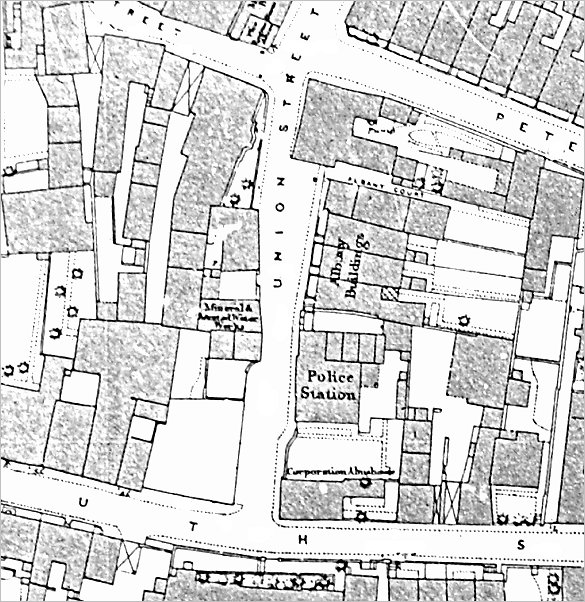
This map, based on the 1886 Ordnance Survey, shows the premises of the Yeovil Mineral and Aerated Water Company Limited's premises, at 10 Union Street, at the centre of the map. The company also owned the large yard on the corner of Union Street and South Street.
GALLERY
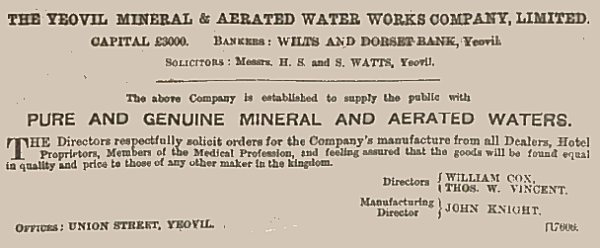
The initial notice of the new Yeovil Mineral and Aerated Water Works Company Limited appeared in most editions of the Western Gazette during June and July 1875. 'Works' was soon dropped from the company's title.
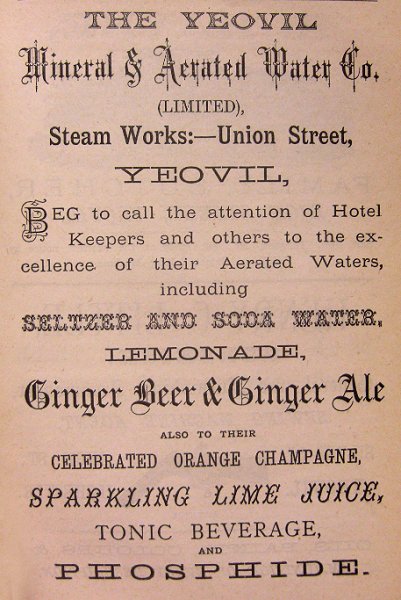
An advertisement in Whitby's Yeovil Almanack Advertiser of 1883 extolling the range of sparkling drinks manufactured by the Yeovil Mineral and Aerated Water Works Company.
|
|
|
A Codd-neck
bottle of The
Yeovil Mineral
And Aerated
Water Company
Limited. The
bottle is 9½"
high x 2½"
across (241mm x
63mm) and had a
leather washer.
It was made by
Powell of
Bristol.
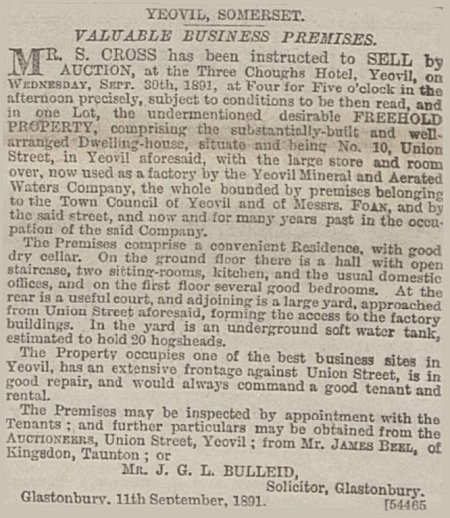
Notice of the intended sale of the Yeovil Mineral and Aerated Water Works Company's premises in the 18 September 1891 edition of the Western Gazette.

Notice of the intended sale of the Yeovil Mineral and Aerated Water Works Company's business in the 7 August 1896 edition of the Western Gazette.
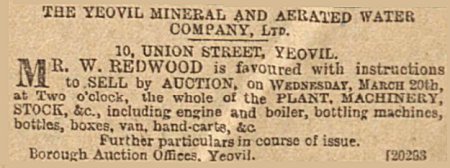
If, at first, you don't succeed..... try selling the business again a few years later. Notice of another intended sale of the Yeovil Mineral and Aerated Water Works Company's business in the Western Gazette's edition of 5 October 1900.
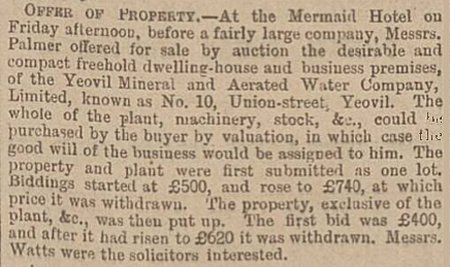
Unfortunately the sale didn't proceed very well as seen in this report in the 14 December 1900 edition of the Western Gazette.
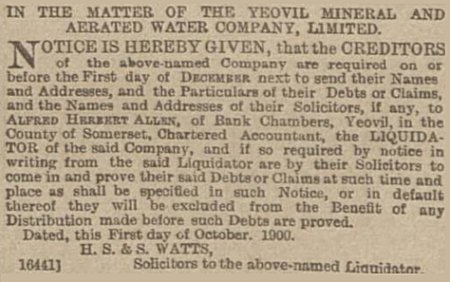
So, if you still don't succeed - go into liquidation. This notice from the 5 October 1900 edition of the Western Gazette.
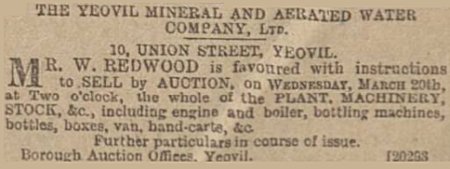
.... and still they couldn't sell it - this notice is from the 8 March 1901 edition of the Western Gazette.

